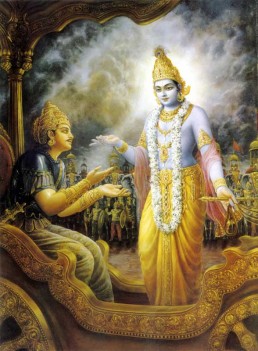Swami Chinmayananda
Swami Chinmayananda Commentary
In the last stanza, it is said that, even a man, well-read in the Shastras, cannot easily follow the highly ethical life which is demanded of a spiritual seeker, because his lower nature proves too strong for him. Prescribing a medicine which is not available, is not the art of healing. It is the philosopher’s duty, not only to indicate the weaknesses in our present life and the State-of-Perfection, but he must also show us ways and means by which we can transport ourselves from our weaknesses into this ideal State-of-Perfection. Then, and then alone, can the philosopher bless his generation.
Krishna indicates here the great robber in the ‘within’ of man, which loots away the true joys and thrills of ‘right living.’ Attachments and aversions of the sense-organs for their respective sense-objects are instictive, and natural, in every one. The sense-objects by themselves are incapable of bringing any wave of sorrow or agitation into the ‘within.’ We get agitated and disturbed not at our sense-organs, but in our mind. The mind gets disturbed because, when the stimuli reach the mind, it accepts, in its inherent mischief, certain types of stimuli as GOOD, and their opposites as BAD. Thereafter, it gets attached to the stimuli it experiences as good and develops an aversion for the opposite type of stimuli. Now the mind is prepared to suffer the agonies of existence in the sorrowful plurality. Whenever it comes in contact with the infinite number of objects outside, it pants to court the things of its own attachment and labours to run away from the things of its own aversion. This excitement of the mind is truly ‘its tragedy.’ Having stated this Truth, Krishna advises all seekers:”LET NONE COME UNDER THEIR SWAY.”
The philosophy of Geeta does not suggest, even in its implications, any kind of running away from the world-of-sense-objects. Krishna’s creed is to live HERE and NOW, in the midst of situations in life, in this very world, and to experience them through our sacred vehicles of the body, mind, and intellect. The only insistence is that on all occasions, a wise man should be a master of the vehicles and not a helpless victim of these matter-envelopments. And the secret of this mastery in life is to live free from the tyrannies of attachments and aversions.
In order to detach ourselves from both our likes and dislikes, we have to get rid of our false ego-centric vanities. Likes and dislikes belong to the ego. Therefore, all ego-less acts, as we have explained earlier, accomplish a purgation of Vasanas. Vasanas create the mind; where the mind is, there revels the ego. To the extent the Vasanas have been reduced, to that extent the mind has become non-existent. Where the mind has ended, there the reflection of the Consciousness called the “ego” has also ended.
THE METHODS BY WHICH WE CAN BRING ABOUT THE VASANA-PURGATION ARE EXPLAINED IN THE FOLLOWING:
Adi Sankara Commentary
Raga-dvesau, attraction and repulsion, in the following manner-attraction towards desirable things, and repulsion against undesirable things; (vyavasthitau, are ordained,) are sure to occur, arthe, with regard to objects such as sound etc.; indriyasya indriyasya, of all the organs, with regard to each of the organs. As to that, the scope of personal effort and scriptural purpose are being stated as follows: One who is engaged in the subject-matter of the scriptures should, in the very beginning, not come under the influence of love and hatred. For, that which is the nature of a person impels him to his actions, verily under the influence eof love and hatred. And then follow the rejection of one’s own duty and the undertaking of somebody else’s duty. On the other hand, when a person controls love and hatred with the help of their opposites [Ignorance, the cause of love and hatred, has discrimination as its opposite.], then he becomes mindful only of the scriptural teachings; he ceases to be led by his nature. Therefore, na agacchet, one should not come; vasam, under the sway; tayoh, of these two, of love and hatred; hi because; tau, they; are asya, his, this person’s pari-panthinau, adversaries, who, like robbers, put obstacles on his way to Liberation. This is the meaning. In this world, one impelled by love and hatred misinterprets even the teaching of the scriptures, and thinks that somebody else’s duty, too, has to be undertaken just because it is a duty! That is wrong:
The Bhagavad Gita with the commentary of Sri Sankaracharya – Translated by Alladi Mahadeva Sastry
Holy Geeta – Commentary by Swami Chinmayananda
The Bhagavad Gita by Eknath Easwaran – Best selling translation of the Bhagavad Gita
The Bhagavad Gita – Translation and Commentary by Swami Sivananda
Bhagavad Gita – Translation and Commentary by Bhaktivedanta Swami Prabupadha
Srimad Bhagavad Gita Chapter 3 – Verse 34 – 3.34 indriyasyendriyasyarthe – All Bhagavad Gita (Geeta) Verses in Sanskrit, English, Transliteration, Word Meaning, Translation, Audio, Shankara Bhashya, Adi Sankaracharya Commentary and Links to Videos by Swami Chinmayananda and others – 3-34

